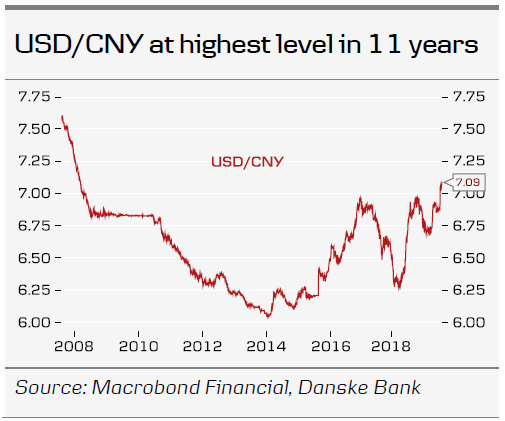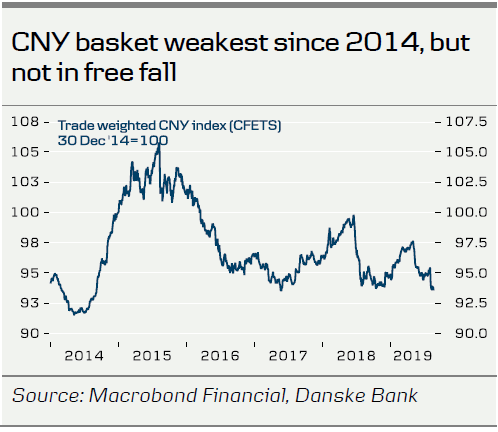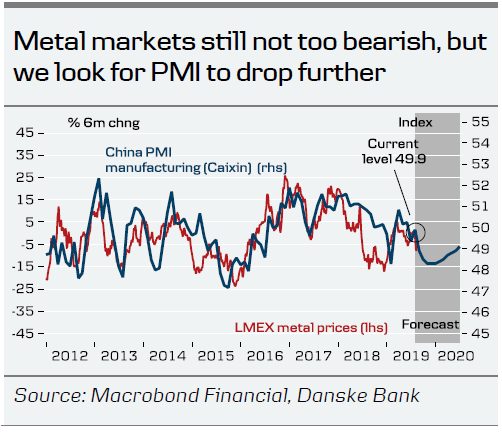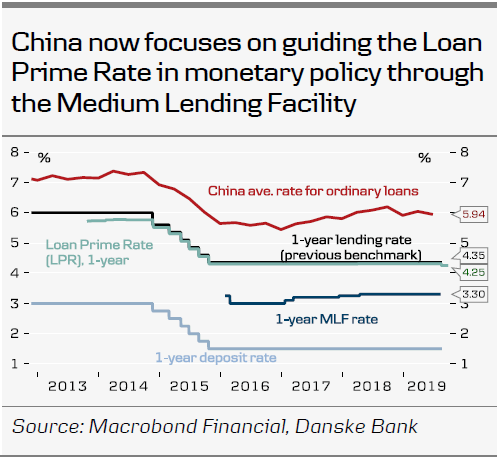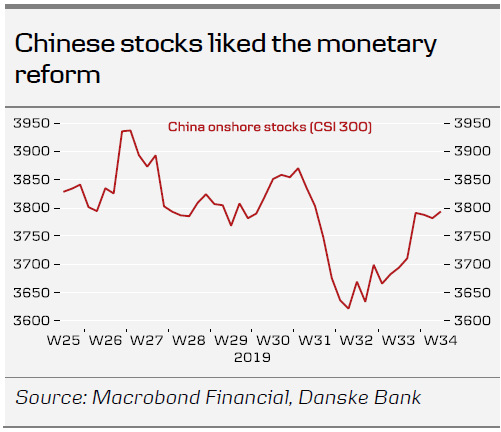- China retaliated against Trump’s tariff hikes on Friday. While countermeasures were expected, it was a reminder that the trade war is alive and kicking.
- The retaliation is not over, though. China stated this week that it will announce the names on its ‘unreliable entities list’ soon, a countermeasure to the sanctions on Huawei.
- USD/CNY moves to new 11-year high. We look for further CNY weakness.
- Monetary reform to pave the way for more easing. Our GDP forecast for 2020 is lowered to 6.0% from 6.2% on continued trade war headwinds.
Due to holiday there will be no China Weekly Letter next week.
China to reveal names on ‘unreliable entities list’ soon
On Friday afternoon, China announced countermeasures to Trump’s 10% tariff on USD300bn of Chinese goods. 5-10% tariffs will be added on USD75bn of goods. Tariffs on US cars will go as high as 50% for some autos as the exemption of a 25% tariff hike is suspended. The countermeasures will also hit soybeans and oil. This is not likely to be the end of Chinese retaliation. China has not yet put countermeasures on US firms from the export ban on Huawei. But this week China stated it will soon announce names on its ‘unreliable entities list’, which was formed as a response to the US ‘Entity List’ that blacklists Huawei and other Chinese companies.
On Monday the White House announced that Huawei will get a further 90-day exemption from the blacklist. However, the exemption was mainly for domestic purposes and to underline that the exemption was not a softening, another 46 affiliates of Huawei were added to the list. Illustrating what a big blow the blacklist is, Huawei founder Ren Zhengfei wrote in an internal memo that Huawei is in a ‘live or die’ moment and he encouraged underutilized employees to form ‘commando squads’ to explore new projects.
This week Trump defended the trade war describing himself as ‘the chosen one ‘ after saying that ‘this is a trade war that should have taken place a long time ago.’ Trump has faced a bit more resistance lately as it is clear that China and the US are not anywhere near signing a trade deal and that the US economy is showing more signs of damage from the trade war. CNBC’s ‘Mad Money’ host Jim Cramer referred to warnings from Home Depot’s CFO that the trade war could soon hurt consumer confidence. Cramer who has supported the trade war stated that ‘I hope the President takes this opportunity to make a deal’ and that ‘the last thing any President wants is a trade war related recession as we head into election year’. A Washington Post article this week also described concern about the economy brewing inside the White House.
We still have not had confirmation of trade talks set to take place in September. White House economic adviser Larry Kudlow said that talks at deputy level had been quite constructive and that ‘this may lead to a meeting of the principals here in Washington’. The ultra China hawk Peter Navarro said on Friday that there would be negotiations.
Comment. The Chinese retaliation was not a big surprise but nevertheless a reminder that the trade war is alive and kicking. When China announces the first US names on the ‘unreliable entities list’, it is also likely to draw headlines and it will obviously be very negative for the US companies involved. If China aims for companies that match the size and importance of Huawei, it will be big names.
We still see very little sign of progress in the communication between the two sides and Kudlow’s comments suggest that a September meeting is not yet a done deal. The fact that the White House is increasingly concerned about the US economy will make it harder for Trump to escalate the trade war much further as it will increasingly weigh on the economy and he could face increasing scepticism about his trade war strategy.
USD/CNY climbs to another 11-year high
The Chinese renminbi continued to weaken against the dollar this week, briefly touching 7.10 on Friday (see front page), the highest level since 2008. The trade-weighted CNY basket dropped to the lowest level since 2014. China’s currency system is a managed float against the currencies in the basket.
Comment. The depreciation is a reflection of the concern over the Chinese economy as the trade war drags on. While the renminbi is weakening it is not in a free fall. The People’s Bank of China (PBoC) will watch it closely and probably intervene if the depreciation accelerates. So far, it continues to set the daily fixing at a stronger level than the closing rate the day before using the so-called ‘countercyclical factor’ to signal it does not wish too strong a decline.
Our forecast is for USD/CNY to continue to grind higher towards 7.20 in 6M. The continued CNY depreciation is a continuous red flag for US President Donald Trump and not helping sentiment between the two sides. But it seems clear from the move, that China no longer aims to keep CNY stable as was the case during the time when negotiations were ‘serious’ and China wanted to show goodwill by not letting the currency weaken.
More stimulus coming, monetary reform to improve efficiency
China announced a reform of the monetary system this week that gives more weight to the Loan Prime Rate (LPR). The LPR will replace the benchmark lending rate at 4.35% and the 1-year LPR was set at 4.25%. The PBoC will also set a 5-year LPR. The LPR is the lending rate banks offer their best clients and is based on quotes from a range of banks. They now have to use the Medium Lending Facility (MLF) rate to guide the quotes (see chart). The MLF is based on the liquidity PBoC offers in this facility.
Comment. With the new system in place, the road is paved to ease monetary policy by guiding lending rates lower. The PBoC has had success in pushing government bond yields and money market rates lower, but not the lending rates to the real economy. The goal of the reform is to improve the transmission mechanism according to the PBoC. The State Council has stated that it wants a reduction of financing costs of one percentage point for small businesses over the next year and that we should expect more reductions in the LPR in coming quarters. As we wrote last week, the National Development and Reform Commission also plans more stimulus for households this year and in 2020.

